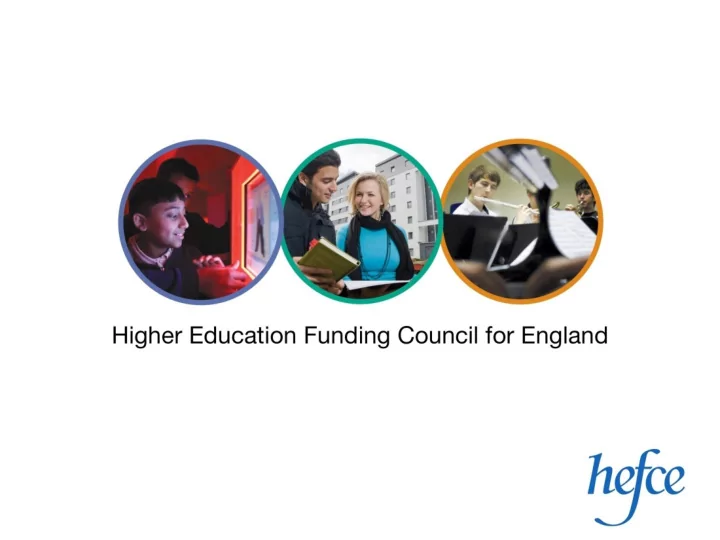

Welcome slide
HEPI Autumn 2011 Conference Alan Langlands 22 November 2011
Key messages • the context is changing • the glass is half full • keep looking outwards • get the fundamentals right o including alignment • revisit the knowledge equation • make the case for future funding o implement the REF
…….the context is changing
The policy context • the Independent Review of Higher Education and Student Finance (October 2010) • Parliament approves £9K fee limit (December 2010) • HE White Paper (June 2011) • HEFCE Strategy statement (July 2011) • BIS Technical Consultation (August 2011) • HEFCE Business Plan (October 2011) • Innovation & Research Strategy (December 2011)
Context • economic uncertainties • a focus on recovery and growth • an obligation to the next generation • a degree of volatility • strong foundations • a world reducing in size and increasing in complexity
…….the glass is half full
A successful UK research base • 11 UK universities in the World universities ranking top 100 (second only to US) • UK attracts 15% of all international doctoral students (second only to US) • 3rd in G8 (behind US and Germany) for production of PhD qualifiers • UK produces more publications and citations per pound spent on research than other G8 nations • With 1% world population we produce 6.9% of world publications, receive 10.9% of citations and 13.8% of citations with highest impact.
…….keep looking outwards
Looking outwards • reducing carbon-dioxide emissions and tackling climate change • global health • international relations • energy, food and water security • changing demography • technological advances
Malaria Public health expenditure HIV/AIDS Private health expenditure Diabetes
London International Development Centre Three thematic programmes: • Emerging and zoonotic diseases • Access to medicines for the poor • Agri-health Working across sectors and disciplines: Millennium Development Goals, water governance, technology in Africa, HIV/AIDS and economics.
Research excellence
Internationally mobile research base • 63% of researchers who worked in UK institutions in the period 1996-2010 had also published from institutions outside the UK • researchers who have returned to the UK after an extended time abroad (over 2 years) are significantly more productive than those who never left the UK • researchers who come from abroad and stay in the UK for less than two years are more productive than the average and most often came from the US • leading researchers from abroad find the UK an attractive place to work at least for a time • UK brain drain?
…….get the fundamentals right…including alignment
Fundamentals • sustaining the balance between curiosity driven research and work targeted on national priorities • maintaining the dual support system • long term commitment of funding • vibrant postgraduate and postdoctoral communities • the research excellence framework • supporting international research collaborations
Research and innovation Research funding flows to HE Business: c.£600m Technology HEIF £150m Approx total: Contract research = £382m Strategy Board (facilitates user £4 ¾ bn* Consultancy = £141m c. £65m engagement) Collaborative research = ? Other non-commercial European Including charities, Commission RDAs and other c.£400m Universities government departments c.£600m Other Collaboration international c. £680m (unknown) Dual support HEFCE research funding: £1.6bn 7 UK Research Councils: c.£1.8bn BIS Mainstream QR = £1.1bn (NB. This is just over 50% of the RC total. The rest goes to Research degree fund = £205m Research Council Institutes, international facilities for UK Charity support = £198m researchers, etc) Business QR = £64m * This is an estimate. Excludes informal flows, funding in kind and other funding streams that universities themselves may channel into research.
Dual support system funding Francis Crick Institute Population based data Research intensive Research universities Councils O UK Funding Pharma and S Academic Health Councils the healthcare C Science Centres industries H Biomedical R Charities Key NHS Trusts NIHR DH funding
…….revisit the knowledge equation
Tackling higher education reform
KC > KD + KA Knowledge creation
KC = KD + KA Knowledge dissemination
KC = KD + KA Knowledge application
Benefits of research Clinical medicine • Impacts on patient outcomes, health policy and practice, medical technology and the pharmaceutical industry Physics • Impacts on high-tech products and services, public engagement with science and defence and energy policy Earth systems & environmental sciences • Impacts on environmental policy, conservation, managing the environmental, utilities, risks and hazards, exploration of resources, public health Social work & social policy • Impacts on social policy, public services, third sector, practitioners and public debate English language & literature • Impacts on creative industries, cultural enrichment, civil society, English as a global product, policy development
…….make the case for future funding ……implement the REF
Timetable 2011 2012 2013 2014 • Panels appointed • Final panel criteria • Launch REF • Panels assess (Feb) and methods (Jan) submissions system submissions • Guidance on • HEIs submit codes • Recruit additional • Publish outcomes submissions (Jul) of practice (Jul) assessors (Dec) • Draft panel criteria • Survey of • Staff census date for consultation submission (31 Oct) (Jul) intentions and • Submissions requests for multiple • Close of deadline (29 Nov) submissions consultation (5 Oct) (Oct-Dec)
The assessment framework: Overview Overall quality Outputs Impact Environment Maximum of 4 outputs Template and case Template and data per researcher studies 65% 20% 15%
Thank you for listening a.langlands@hefce.ac.uk
Recommend
More recommend